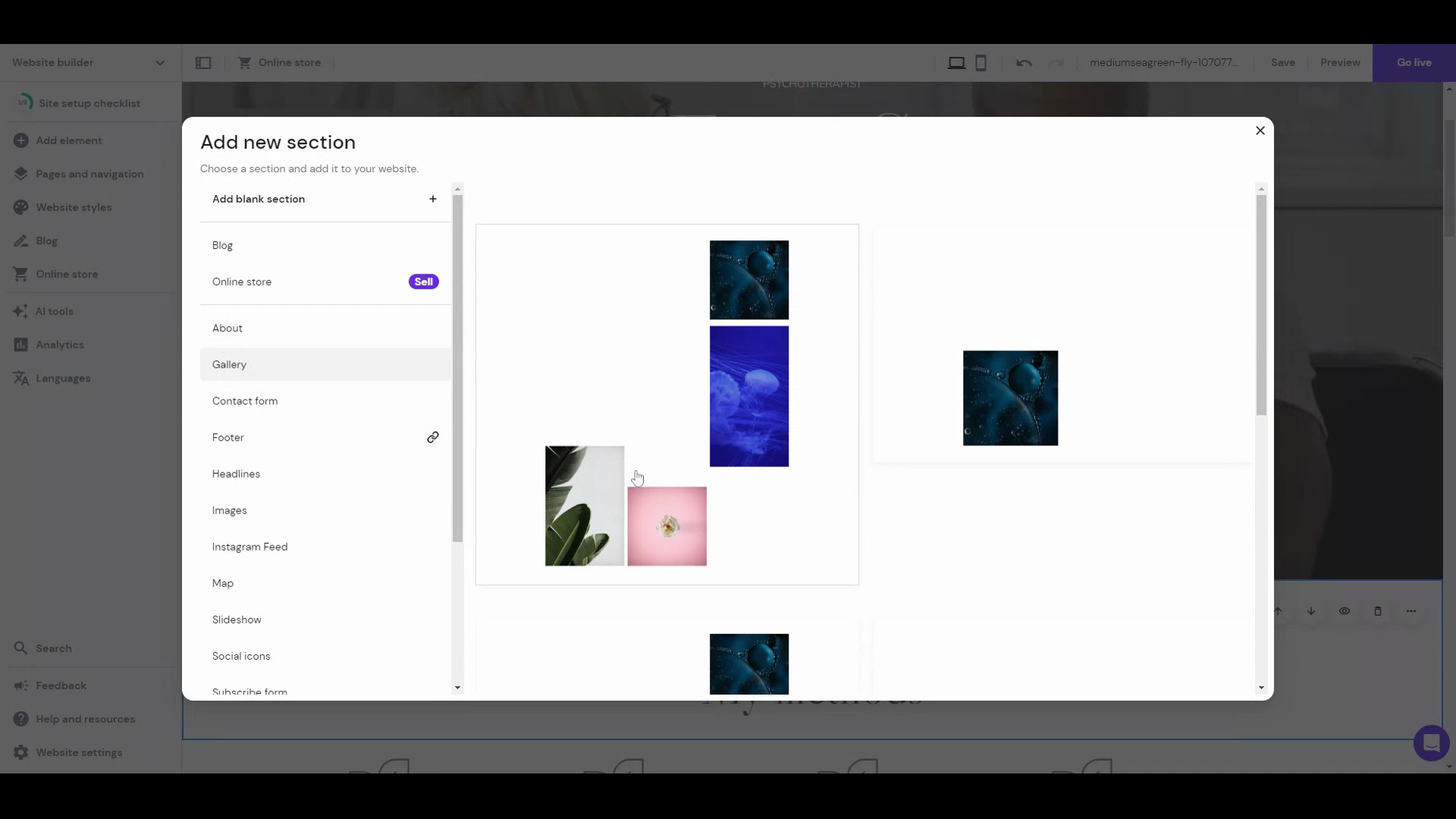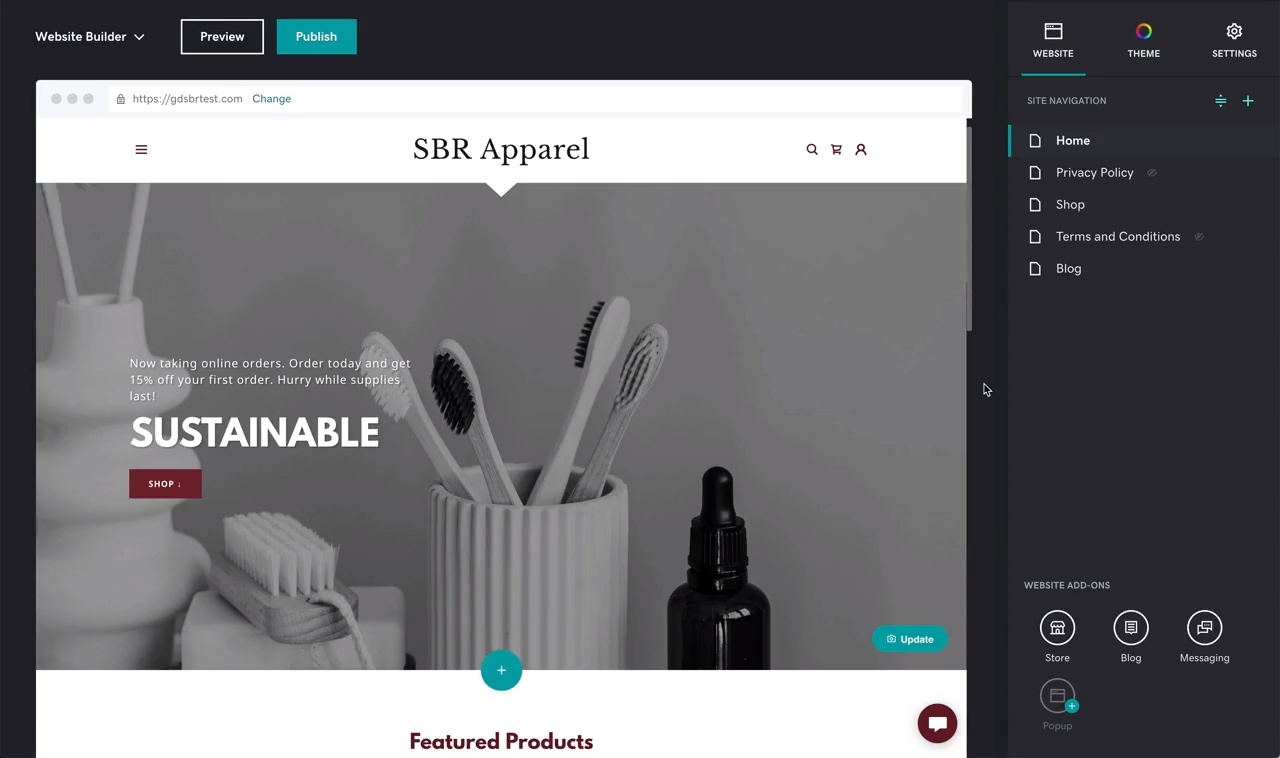Best Website Builder
I test every website builder so you don’t have to. These are my rankings of the best website builders in 2025.
Our work is supported by affiliate commissions. Learn More
Our work is supported by affiliate commissions. Learn More
By Juhil Mendpara | Updated Feb 24 2025
With a 46% market share, Wix is the most popular website builder.
It can be—and is—used for pretty much all types of websites - portfolios, blogs, ecommerce, churches, weddings, etc.
But is it the best option out there? Well, that depends.
There are quite a few reasons you’d want to choose a Wix competitor:
You can find better alternatives for one, a few, or most of these reasons to avoid Wix.

Squarespace Overview (2:41)
Squarespace is the best overall Wix alternative. In fact, it is the best overall website builder.
The* Wix vs Squarespace* comparison is almost like Mac vs PC: Squarespace is curated and design-y like Mac, while Wix is occasionally chaotic but allows for extra freedom to customize.
Here’s where Squarespace is better than Wix:
Squarespace plans start at $16 per month on annual plans. There is no free plan, but they have a free trial—no credit card is required.
The base plan is perfect for non-business/non-ecommerce websites like personal sites, resume websites, portfolio websites, wedding websites, etc. However, you need to choose a Commerce plan otherwise, which starts at $27/month if you pay annually.
All annual plans include a free custom domain name for one year. 👍







Shopify Overview (4:12)
Shopify is the best Wix alternative for ecommerce.
Shopify is just meant for ecommerce, so if you were looking for some other Wix use case, you are better off with another alternative that is a better fit.
We’ve compared Wix and Shopify and Wix, Shopify, and Squarespace, and Shopify is miles ahead (for obvious reasons). Here’s sort of our Wix Ecommerce vs Shopify verdict:
Wix can work for small stores, but…
You can learn more about it here.
Shopify has three main plans that cost between $29/month and $299/month (paid annually). However, you can try it for free (without a credit card) for three days and pay $1/month for the first three months to test the platform.
Beyond that, there is Shopify Plus (an enterprise plan) and Shopify Starter (a $5 plan that adds Shopify’s ecommerce functionalities to your current non-Shopify site through their Buy Button channel).
One criticism of Shopify is that there are often additional costs beyond the monthly plan. For example: you may need to buy a custom Shopify template or an app from the Shopify app store.
Learn more about all the costs in our detailed Shopify Pricing guide.







Webflow Overview (2:47)
Try Webflow if you find Wix too constricting.
Webflow is the most customizable website builder on this list. If you can imagine it, you can probably make it with Webflow.
Just be aware: Webflow has a learning curve. So either you need to learn it (which can take days, weeks, or months depending on your technical experience) or hire a professional Webflow developer to make your website.
A popular analogy is that DIY website builders such as Wix are like Canva, and Webflow is like Photoshop: Anyone can use Canva and create graphics that work for many use cases. But for fully custom graphics/images, advanced photo editing features and manipulation capabilities of Photoshop do a superior job—the caveat is you need to know graphic design and learn Photoshop (it’s not intuitive).
Some of the Webflow features that are superior to Wix:
Side Note: Wix has Editor X and Wix Studio that are more comparable to Webflow.
Webflow has two types of plans:
They also have separate plans for freelancers and agencies offering Webflow services.







WordPress is an open-source Wix alternative suitable for unconventional features and more control.
WordPress isn’t a website builder like Wix. Instead, it’s an open-source Content Management System (or CMS). CMSs like WordPress have a steeper learning curve but are much more flexible.
The reason WordPress is so flexible is the community behind it: thousands of developers contribute free plugins and themes, so there are themes and plugins for just about anything you can think of.
Here are some places where WordPress shines in comparison to Wix:
Of course, it has downsides, too, from a huge learning curve to maintenance and security problems. See our full Wix vs WordPress comparison to learn more.

An overview of Carrd. (2:06)
Let’s go to the opposite side of Webflow and WordPress…Carrd is a great Wix alternative for simple one-page websites.
Carrd is focused on the niche of one-page websites. This makes it a great option for landing pages and personal websites that don’t need multiple pages.
For this niche use case, Carrd is superior for:
Carrd has a great free plan, which would work for most use cases if you don’t mind Carrd branding. Then there’s a Pro Lite plan costing $9/year, but it doesn’t offer that much.
I like the $19/year Pro Standard plan the best — it allows up to 10 websites, custom domain URLs, widgets, and more.
Their most expensive plan gives access to advanced settings and costs $49/year.
Hostinger’s website builder is simpler but comparable to Wix.
It is an excellent value-for-money proposition, but it’s fairly new and lacks advanced features that Wix and other alternatives have.
Here are a few examples where Hostinger is the inferior website builder: you can’t add a comment section to your blog; ecommerce is limited to 500 products and basic; you can’t add a background video; there’s no option for password-protecting certain pages; the editor blocks and sections are basic: you can’t add multimedia, menu, calendar, etc. On top of that, there’s no app store to extend the builder’s functionality. And the 140+ templates are bland and basic compared to Wix.
But it also is a good Wix alternative because:

The Hostinger Website Builder landing page mentions only one pricing — $2.99/month (prepaid for 1-4 years, then renews at $6.99/month).
However, you get the website builder with all Hostinger hosting plans. Its web hosting/shared hosting plans start at $1.99/month (renews at $3.99/month), and cloud hosting starts at $9.99/month (renews at $19.99/month).





GoDaddy is a decent Wix alternative for simple, multi-page websites.
For simple websites (see examples), GoDaddy website builder is one of the easiest website builders. Plus, it also includes a suite of business and marketing tools: ecommerce, appointment scheduling, email marketing, social media management, graphic design, and a simple CRM, making it an overall good choice for a range of websites.
However, it ranks low on the customization front.
GoDaddy has what we call a “block-based editor” compared to Wix’s “drag and drop editor.” A drag-and-drop website builder offers a visual interface where users can create and customize their websites by simply “dragging” and “dropping” various elements onto a page. On the other hand, a block-based editor lets you make the website by adding blocks and customizing them.
It has some MAJOR limitations when it comes to customizing your website, frustrating enough to that I’d only recommend it if you was just a very, very simple website.
For example, you can’t add individual elements to a website, and you’re often not able to make simple style customizations.

Godaddy Editor: Adding a section.
GoDaddy pricing is comparable to many similar website builders — plans start at $9.99 per month and get more expensive for ecommerce plans. It also has free plan, which we don’t recommend – see why in our free website builder rankings.
Depending on what you need the website for, you might find a good niche website builder (i.e., a website builder made for the specific purpose).
Here are some examples:





